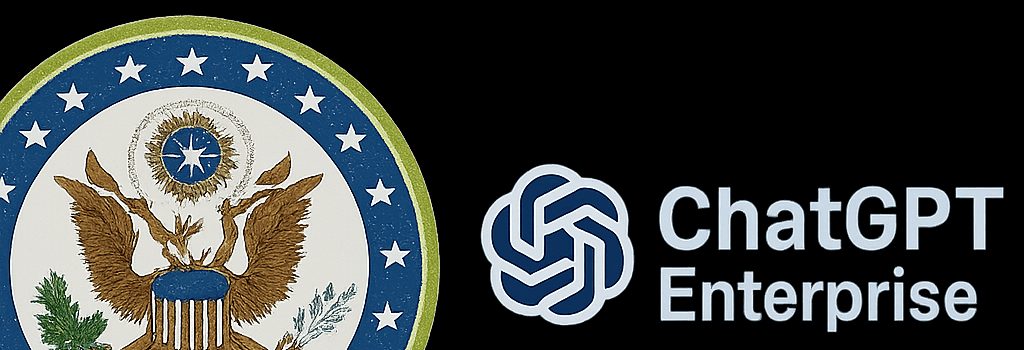US Executive Branch Uses ChatGPT Enterprise for $1 per Agency

Overview of the Agreement
On August 6, 2025, OpenAI announced a landmark agreement with the U.S. federal executive branch to provide more than 2 million federal employees access to ChatGPT Enterprise at a nominal cost of just $1 per agency for one year. This follows the General Services Administration’s (GSA) blanket purchase agreement, signed a day earlier, which allows OpenAI and competitors (Google, Anthropic, etc.) to supply large language model (LLM) tools under standardized federal contracting terms.
- Product Tier: ChatGPT Enterprise (frontier models, advanced features, high token quotas)
- Advanced Features (60-day trial): Deep Research, Advanced Voice Mode, custom analytics dashboard
- Data Privacy: FedRAMP High authorization, FISMA-compliant encryption, zero data retention policy
- Renewal: No obligation after 12-month trial
Technical Specifications and Implementation
ChatGPT Enterprise for federal use runs on a dedicated cloud infrastructure within Microsoft Azure Government (SOvereign Cloud). Key technical specifications include:
- Model Architecture: GPT-4 Turbo (approx. 1.8 trillion parameters), 32k–128k context window options
- Throughput & Latency: Optimized for sub-300ms response times under peak loads, autoscaling across NVIDIA H100 GPU clusters
- Identity & Access Management: Integration with PIV/CAC cards, SAML 2.0 SSO, SCIM-based user provisioning
- Encryption: AES-256 at rest, TLS 1.3 in transit, customer-managed keys (CMKs) via Azure Key Vault
Data Security and Compliance Measures
Federal agencies require elevated security standards. OpenAI’s deployment meets:
- FedRAMP High: Provisional Authority to Operate (P-ATO) on Azure Government Cloud
- FISMA: Controls aligned with NIST SP 800-53 Rev. 5
- Data Handling: No fine-tuning on government data; all prompts/logs are isolated and can be purged on demand
Performance and Scalability Considerations
Behind the scenes, OpenAI leverages horizontal scaling via Kubernetes on Azure ARC, ensuring:
- High availability across three U.S. regions (East, Central, West)
- Automated failover and canary deployments for model updates
- Resource reservations for mission-critical workloads (e.g., DoD pilot programs)
Expert Perspectives
“By leveraging FedRAMP High infrastructure and PIV/CAC integration, agencies can adopt generative AI without compromising classified or sensitive data,” says Dr. Alicia Ramirez, Cloud Security Architect at the National Institute of Standards and Technology.
“With 128k context windows, analysts can feed entire policy documents to GPT-4 Turbo and receive comprehensive summaries in seconds,” notes Michael Chen, AI policy specialist at the Center for Data Innovation.
Implications for Federal IT Infrastructure
This rapid, low-cost deployment has wide-ranging effects on federal IT strategy:
- DevSecOps Pipelines: Agencies can embed generative AI into CI/CD workflows for automated code reviews and documentation.
- ITSM Integration: Chatbot assistants in ServiceNow and Remedy to triage tickets and draft resolutions.
- Cost Savings: Reduced manual processing; early estimates suggest up to 30% efficiency gains in administrative tasks.
Potential Future Developments
While the Trump administration’s “Preventing Woke AI” executive order mandates neutrality and bans ideological dogma (e.g., DEI campaigns), OpenAI has signaled plans to offer custom models for national security. It remains unclear whether these will include bias mitigation aligned with specific political directives.
“This effort delivers on a core pillar of the AI Action Plan by making powerful AI tools available across the federal government so that workers can spend less time on red tape and more time serving the American people,” OpenAI stated in its blog.
After the 60-day advanced features trial, agencies can opt to continue with the standard ChatGPT Enterprise offering, negotiate custom SLAs, or switch to alternative providers under the GSA contract.